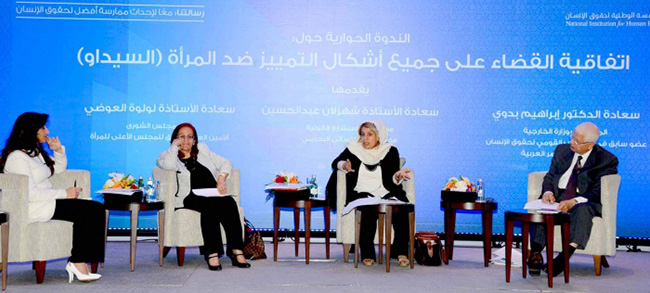National Institution for Human Rights organizes a seminar on the CEDAW Convention

National Institution for Human Rights organized a seminar on the Convention against All Forms of Discrimination against Women (CEDAW) and its role in the protection of human rights of women, which was held to coincide with the willingness of the Kingdom of Bahrain to discuss the third report to the Committee on the Elimination of Discrimination against Women, to be held in the Palace of Nations in Geneva on February 11, 2014.
In a speech delivered by the Chairperson of the National Institution for Human Rights HE Dr. Abdulaziz Abul he stated that holding the seminar is part of a strategy and a work plan of the National Institution for Human Rights for the years 2013-2016 that have been launched recently, in order to spread the culture of human rights, to defend these rights by all available means and make individuals aware of the fundamental rights guaranteed to them by national legislation and international agreements. He expressed hope that the institution achieves the desired goals in the deployment, development, promotion and protection of human rights in the Kingdom of Bahrain.
HE Dr. Abul affirmed that women's rights have become an integral part of the United Nations commitments by supporting them through international agreements the forefront of which is the Convention on the Elimination of All Forms of Discrimination against Women that includes provisions obliging governments, governmental and non-governmental institutions whether national and international, to intensify efforts to protect and boost these rights, knowing that this convention bridges the gap between men and women in the field of development.
On the other hand, HE the Chairperson of the National Institution for Human Rights pointed to the Kingdom of Bahrain’s devotion towards equality and non-discrimination between men and women according to the Constitution of the Kingdom, which is manifested by the people endorsement of the National Action Charter.
The National Action Charter included specific provisions to women the most important of which is the rights of political participation and the commitment of the state to ensure women’s rights not conflicting with Islamic law.
Also government initiatives, including the establishment of equal opportunities units in various ministries, official institutions and private sector, as well as integrating the needs of women in the development process. He added that the legislative and executive authorities pursue to enact laws criminalizing violence against women, and other laws that realize fairness to women.
At the outset of the seminar Ms. Lulwa Saleh Al Awadhi Shura Council member and former secretary general of the Supreme Council for Women reviewed national laws and legislation governing the rights of women in the Kingdom of Bahrain, which is the Islamic Sharia, the National Action Charter and the Constitution of the Kingdom of Bahrain for the year 2002.
She also explicitly referred to international declarations and agreements pertaining to human rights and women's rights, that is the Declaration of Human Rights, the International Convention to combat all forms of discrimination against women, and implicitly referred to the International Convention on the Rights of the Child and other relevant international agreement including the International Covenants on Civil, Political and Social Rights.
The Shura member presented an introduction of the most important provisions of the convention, its articles, compatibility of its goals with the United Nations Millennium Development Goals, domain of work and basic principles from which the convention takes off where they should adopt the concept of human dignity when discussing women's rights, the adoption of the concept of gender equality and the principle of equal opportunities in the development and protection of women against all policies that may affect the enjoyment of fundamental rights, as well as putting women's rights as a foremost human right without having to justify it.
Ms. Lulwa Al Awadhi also pointed to the new items of the convention, which is to expand the human rights of women, to take the necessary measures and determine the necessary actions to achieve equality in all areas, to call for taking temporary measures (positive discrimination), and obliging states to work on the modification of the prevailing behavior patterns (social, cultural and stereotypes), in addition to the imposition of equality and non-discrimination standards in private and public life alike. She explained that the agreement did not address the provisions of reproductive and sexual rights of women, and did not address the protection of women against all forms of violence in a straightforward texts.
Al-Awadhi said that the convention objectives are consistent with eliminating disparities based on gender, women's empowerment and achieving basic education for both genders.
She pointed to the reservations about the CEDAW convention, noting that the justifications of the Arab and Islamic countries’ reservations came about the agreement opposition to the national legislation and the provisions of Islamic law, and respect the principle of sovereignty, but she drew attention to some Arab countries withdrawing their reservations about the convention recently, including Morocco and Yemen, also Jordan has withdrawn its reservation to article (2), and Egypt has withdrawn its reservation to article on nationality.
Al-Awadhi said that the articles subjected to reservation from the Kingdom of Bahrain were article (2) to ensure its implementation within the limits of the provisions of Islamic law, article 9 paragraph (2), article 15 paragraph (4) and article (16) in what do not conflict with the provisions of Islamic law, and article 29 paragraph (1). She touched on the mechanism of monitoring the implementation of the convention in member states, through the formation of the United Nations discrimination committee, comprising 23 experts, in accordance with article 17 of the convention in order to study the progress attained.
She also pointed out the committee’s competencies according to article (18) of the convention where states parties undertake to submit reports on the legislative, judicial, administrative actions or other measures they may take in order to enforce this agreement and on the progress made in that within one year of the entry into force for the countries concerned, and thereafter every four years or whenever the Committee requests.
Ms. Al Awadhi talked about the effect of periodic reports and recommendations of the discrimination committee on the legal and factual status of women in the Kingdom of Bahrain, where periodic reports are raised to the United Nations discrimination committee who in turn raises them to the Social Economic Council thereafter, this comes via official and shadow reports.
The Shura Council member concluded that the recommendations of the committee of discrimination has a direct and powerful effect on the countries striving to develop the status of women, provide technical assistance to some countries on how to overcome the odds, and the training and improvement of bodies concerned with women in how to deal with women’s rights to fill the gaps in the legislation, procedures and measures.
Ms. Shahzalan Abdul Hussain, member of the Bahraini Women's Union confirmed the non-existence of a contradiction between the convention and the constitutional texts stating that it is in harmony with the constitution of the Kingdom of Bahrain, which declares in its articles equality between men and women and the principle of equal opportunities. She added that the convention principle of equality also gets along with the principles of the Islamic religion.
The member of the Women's Union added that we must admit the existence of some discrimination on the ground as a result of the absence of some precautionary measures, and there are a lot of humanitarian cases on discrimination in citizenship for women, but the changes took place recently on the laws developed appropriate solutions to this matter.
Ms. Abdul Hussain discussed housing service as a right for women and the recent amendments on it are in the interest of women's rights. She brought up the idea of (quota) of women in elected councils considering it a temporary measure to get to know the potential of women, and how she manages political posts.
For his part, Dr. Ibrahim Badawi, clarified the importance of understanding the reservations about the agreements in general and that the United Nations took into considerations states sovereignty and was working on the principle of human rights, but there are peculiarities of each country, which was raised in one of the United Nations meetings in the nineties.
He pointed to the role of regulatory bodies to implement the convention, noting that the Charter of the United Nations did not talk about sanctions, except in cases of threats to international peace, and said that the sanctions associated with the principle of cooperation between the states and the United Nations to promote human rights and that the basic objective is to improve the country rather than hold it accountable.
Dr. Badawi drew attention to the importance of cooperation between the United Nations and the signatories to the Convention, and pointed to the non-governmental organizations submitting reports to reach a realistic assessment of the status of women in the states, and that the CEDAW gave the states freedom to join it, emphasizing that Bahrain's accession to the convention confirms its political will and keenness to support women's rights, which appeared in the articles of the Kingdom’s Constitution.
Dr. Badawi said that in case the state acceded to the convention and showed its commitment by taking further actions, it has the right to make reservations as long as they are not inconsistent with the objectives of the convention. The reservations of the Kingdom of Bahrain were on points and principles that are incompatible with its own national constants meaning that the state makes a commitment with the presence of some reservation, but the commitment remains. He affirmed that reservation is a key concept considered in the CEDAW and that the commitment to the convention means applying it in a form of legislation and laws.
The Advisor to the Ministry of Foreign Affairs noted to the reservation of Bahrain on Article 16 of the Convention is in its conflict with the Islamic law, which is a general reservation, and the kingdom’s delegation in the next meeting must emphasize that the reservation is not inconsistent with the principle of equality.
He pointed to the reservation of Bahrain on article 29 on the interpretation of the agreement among the signatories where the convention decided the International Court of Justice to resolve disputes between States, the majority of countries prefer negotiations.
Dr. Badawi stated that Bahrain mentioned it may reconsider some reservations since that does not conflict with Islamic law. He praised the considerable role of the Supreme Council for Women in consultation with the competent authorities and submitting its recommendations to the Cabinet to have another look at the previous reservations in light of which the Cabinet approved a bill to amend the reservations in the Decree Law to join the convention.
Asserting that the stance of the Kingdom on the CEDAW convention is positive and is illustrated by the willingness to engage in dialogue and to bring the bright face of Islamic law into view, Dr. Badawi said that the Fatwa and Legislation Authority submitted a new text in a different format about the Kingdom‘s reservations to articles (2) and (16) of the convention that is "Bahrain is committed to what was mentioned in these articles without prejudice to the Islamic law",


